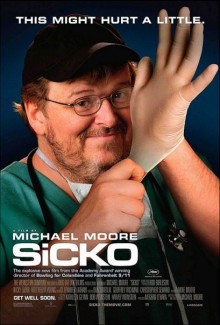Sicko (Michael Moore, 2007): USA
Reviewed by Richard Feilden. Viewed on DVD.
 I have a reputation for keeping Chinese take-out food out of harm’s way. I’ve brought chicken chow mein home safe through wind, rain, an attempted mugging and, when back in the UK a few years ago, a friend’s full blown epileptic fit. While I stopped him from either injuring himself or hurling noodles around the room, his girlfriend called an ambulance. When my American partner panicked about the expense, we looked at her as though she was mad. The idea of worrying about paying for healthcare seems crazy to anyone who lives in a country with socialized medicine. You’ll see that look a lot during Michael Moore’s heartrending documentary Sicko, sometimes from the people Moore interviews, and sometimes from the audience.
I have a reputation for keeping Chinese take-out food out of harm’s way. I’ve brought chicken chow mein home safe through wind, rain, an attempted mugging and, when back in the UK a few years ago, a friend’s full blown epileptic fit. While I stopped him from either injuring himself or hurling noodles around the room, his girlfriend called an ambulance. When my American partner panicked about the expense, we looked at her as though she was mad. The idea of worrying about paying for healthcare seems crazy to anyone who lives in a country with socialized medicine. You’ll see that look a lot during Michael Moore’s heartrending documentary Sicko, sometimes from the people Moore interviews, and sometimes from the audience.
There could not be a more appropriate time for Americans to revisit Moore’s exploration of the US healthcare system, with debate currently raging over the healthcare bill. Moore attempts to put a face on the suffering caused when the system fails those who have brought into it. Using his usual blend of voice over narration, interviews and grandstanding, Moore hopes to expose the dark secret of American medicine, that even if you have health insurance, illness can bring financial ruin. As usual, his film is generally successful and, as usual, there are a string of caveats.
Moore attacks the heath care industry from a variety of directions. On one front he has the victims. Some, denied potentially life-saving treatments, speak from beyond the grave on home videos, while he follows others as they battle against the financial pressures of co-payments and funding refusals. Then he brings out ex-employees of the healthcare industry who bring tales of unscrupulous investigations designed to recover costs, or plans to deny coverage to those who might actually need to use their insurance. Finally he launches an assault from abroad, with the smiling faces and quizzical stares of those who have been nurtured in the bosom of socialized healthcare. It’s a very successful battle plan. It is impossible not to be moved by a woman whose husband was denied treatment that might have saved his life, nor to marvel at the foreign health workers who giggle at the idea of actually charging someone for a stay in hospital. How can an audience not believe a message when it is backed up by home video of people who have died, unnecessarily, before their time? It is all so real!
Less Moore Could Cure Sicko
That is when those exceptions begin to mount up. As mentioned in my review of Papers, a documentary which presents only one side of a story leaves itself open to attack. Where are the interviews with the executives of the HMOs that Moore is rallying against, or at least evidence that they were offered a chance to speak? Why we are not told why Moore’s industry insiders left the employment of the healthcare providers? Could Moore really not find a single person in France, Canada or the UK who wanted to tell a tale of woe regarding the care they had received? While Moore has certainly set out to make a point, he does himself an injustice by not giving more time to his opposition. Let them defend their decisions. Let them explain why they denied care to people who died. Give them the rope and let them orchestrate their own public executions. Only by being challenged can Moore hope to convince those who disagree with him. At least this time his closing stunt, taking 9/11 rescue workers to Cuba for treatment, simply comes off as posturing and showmanship, rather than the stomach churning ‘interview’ with the obviously ill Charlton Heston that ended Bowling for Columbine. That it does not damage the film too badly is the best I can say for it. Yet I am left with the distinct impression that the five-star care that the Cuban authorities gave to them was at least in part put on for the cameras. It all just seems a little too good to be true.
While I agree with Moore’s sentiments, I just wish that he would at least offer up a pretense of balance in his work. If he really wants to make a difference he has to convince people who disagree with him, not the already converted. As it is, I fear that Sicko doesn’t reach far enough into the opposition’s territory to make a difference. Of course, if I become seriously ill I’ll be on the first plane back to Blighty, happy that my health is as safe in the hands of the National Health Service as a portion of egg-fried rice is in mine. At least I have that option.
About this entry
You’re currently reading “Sicko (Michael Moore, 2007): USA,” an entry on Student Film Reviews
- Published:
- 03.16.10 / 2pm
- Category:
- DVD
8 Comments
Jump to comment form | comments rss [?] | trackback uri [?]